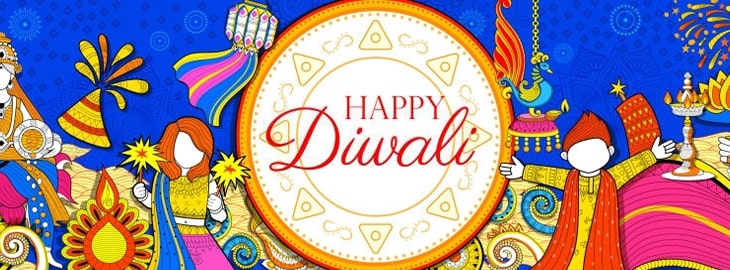Diwali, also known as Deepavali, is an important festival of the Hindus, which encompass the 5 day long festivities ranging from Dhanteras to Bhaiya Dooj. The festivity extends to all of India, parts of Nepal and various other area of the world. The word Deepavali means series of light lamps, due to which Diwali is referred to as the festival of lights. Diwali signify the victory of light over darkness, portraying the success of good over evil.
Non-Hindu community like Jains, Sikhs and Newar Buddhists also celebrate this famous festival. While Jains celebrate it to honor the religious awakening or nirvana attained by Lord Mahavira, the Sikhs observe Bandi Chhor Divas with glee as it marks the day when the 6th Sikh Guru, Guru Hargobind, unshackled the chains of the brutish prison of the Mughal Empire and freed himself.
Diwali: Scriptural Aspects
- Diwali is celebrated during the Amavasya of the Kartik month of Hindu calendar, and the Maha Laxmi pooja is done during Pradosh Kaal. If the Pradosh Kaal does not agree with Amavasya within two days, then Diwali is celebrated on the 2 day. This is the most widely followed way to honor the divine day.
- On the other hand, there is a contrary faith that if the Pradosh Kaal does not coincide with Amavasya during two days, then it should be the 1st day to be chosen for the favorable occasion of Diwali.
- If Amavasya does not happen, and Chaturdashi is followed by Pratipada, then Diwali is celebrating on the day of Chaturdashi itself.
- The most favorable time for Mahalakshmi pooja is during Pradosh Kaal, when any of the fixed ascendant out of Taurus, Leo, Scorpio, and Aquarius, is rising in the eastern horizon. The Pradosh Kaal prevails for almost 2 hours and 24 minutes after sunset. If proper rituals are followed, the blessings of Goddess Laxmi are bound to be bestowing with all her divine majesty.
- Pooja can also be performing during the Mahanishita kaal, which commence 24 minutes prior to midnight and lasts for about the same era post midnight. This time is devoted to pay respect to Maa Kali. Commonly, Pandits, Tantriks, Saints, and people who are well aware of the significance of Mahanishita kaal, utilize this time to offer their devotion to Maa Kali.
Diwali: Puja Rituals
Laxmi Pooja is one of the grandest facets of Diwali. On this most favorable day, Goddess Lakshmi, Maa Saraswati and Lord Ganesha are revered during evening and night. According to the Puranas, Goddess Lakshmi dismounts to the Earth, and visits every house. Any house which is spick and span is chosen by the goddess to reside in, therefore it is said that proper clean-up and lightening of the house should be done on this timely moment so as to please Goddess Laxmi and enjoy her divine blessings.
The following points are to be considered while performing Diwali Pooja:
- Clean the house and sprinkle the sacred Ganga Jal for the spirit of purity before Laxmi pooja. Decorate the house with candles, clay-lamps and Rangoli.
- Create a pooja altar. Spread a red cloth over it and place the idols of Maa Laxmi and Lord Ganesha on it. A picture of both can also be used for the same reason. Put a Kalash filled with water near the altar.
- Apply a Tilak of haldi and kumkum on Goddess Laxmi and Lord Ganesha. Lit a diya (clay-lamp), and place it with sandalwood paste, turmeric, saffron, rice, abeer, gulaal, etc. and offer your devotion.
- After Lakshmi Pooja, veneration of Goddess Saraswati, Goddess Kali, Lord Vishnu and Lord Kuber is performing according to the rites.
- The pooja ceremony should be performing together with family members and friends.
- Following Lakshmi pooja, reverence can be paid to books, closets, business or other wealth related equipments.
- After the completion of pooja, Holi activities like sharing of sweets and Prasad, and charity to needy should be done.
Deeds to be done during Diwali
- Prior to bathing, oil massage should be done, as it is supposed that this prevents financial losses.
- Veneration of intimates should be done to pay honor to your lineage. During Pradosh Kaal, lights should be lit in order to guide the spirits, help them to rise to heaven, and rest in serenity thereafter.
- Midnight celebration preceding Diwali should be done as it helps in remove poverty from the house.
Legends related to Diwali
Hinduism has a number of legends allied with every festival, and so is the case with Diwali. Two main legends are followed by most of the people, and thus stand out as opposed to others.
- On the Kartik Amavasya, Lord Rama return to his kingdom Ayodhya, after defeat the devil king Ravana, and completing 14 years of his exile. The people of Ayodhya celebrated the homecoming of their beloved prince in home by lighting their houses with clay-lamps and candles with jollity.
- According to another legend, the devil king Narakasura stole the revered earrings of Lord Indra’s mother, and abducted 16,000 women. Frighten by Narakasura’s overgrowing powers and consequent actions, the Devtas along with the saints, pleaded to Lord Vishnu for succor. Incarnated as Lord Krishna, he beheaded the devil on the Chaturdashi of Kartik, reclaimed the earrings, and encaged the imprisoned women from the manacles of Narakasura, thus ending the tormenting reign of Narakasura and immortalizes the day as Naraka Chaturdashi. The people celebrated the victory by lighting lamps to express their cheerfulness on the next day, ergo leading to the celebration of Diwali.
Other prevalent legends include:
- Lord Vishnu embodied as Vamana, the dwarf priest, and challenged the Asura Bali, to provide him with enough space to cover 3 strides, to which Bali fervidly agreed. Lord Vamana covered the Earth and Heaven in 2 steps. For the 3rd step, Bali offered his head and was pushed into the underworld, and was chosen the Patal-loka as his kingdom.
- During the churning of the ocean (Samudra Manthan), Goddess Lakshmi appeared in the Kshir Sagar, and accepted Lord Vishnu as her life partner.
Diwali: Astrological significance
Every festival of Hinduism has an underlying astrological importance. It is supposed that the positions of planets on festive occasions are profitable for the mankind. Diwali is a golden chance to give a bright start to anything and everything, ranging from initiation of new tasks to purchasing stuff. As per the Vedic Astrology, the Sun and the Moon are in conjunction during this time, and are placed in the sun sign Libra, under the rule of Swati Nakshatra. This Nakshatra is a feminine constellation linked to Goddess Saraswati, and signifies a harmonious time. Libra represents harmony and balance, and is ruled by the planet Venus which promotes camaraderie, brotherhood, good loyalty and respect, marking Diwali as a favorable time.
Diwali is a favorable time of religious as well as social importance. The festival of Diwali represent the triumph of good over evil, light over darkness, knowledge over ignorance and guides us towards the right path of life.
We wholeheartedly wish you a happy Diwali, and may Goddess Lakshmi bestow upon you, all her lucky and successful blessings, and you witness a glisten future ahead for yourself.



